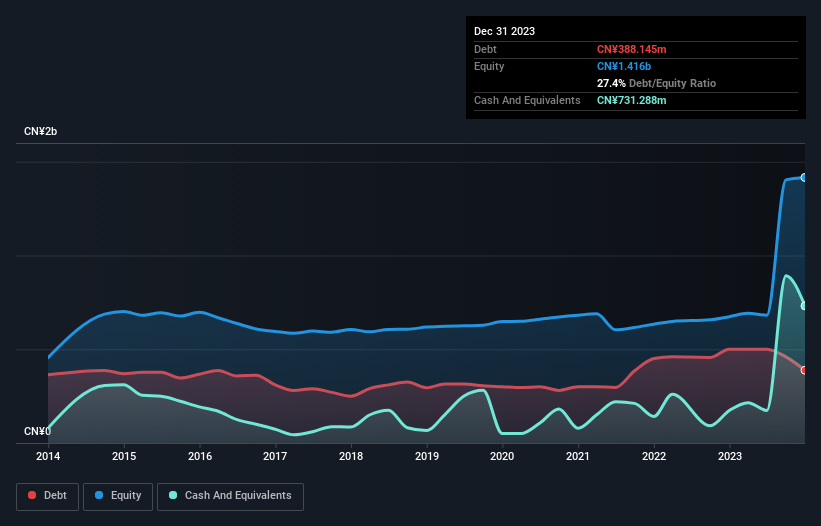
Howard Marks put it nicely when he said that, rather than worrying about share price volatility, 'The possibility of permanent loss is the risk I worry about... and every practical investor I know worries about.' So it might be obvious that you need to consider debt, when you think about how risky any given stock is, because too much debt can sink a company. Importantly, Nanjing Baose Co., Ltd. (SZSE:300402) does carry debt. But the more important question is: how much risk is that debt creating?
Why Does Debt Bring Risk?
Debt is a tool to help businesses grow, but if a business is incapable of paying off its lenders, then it exists at their mercy. In the worst case scenario, a company can go bankrupt if it cannot pay its creditors. However, a more frequent (but still costly) occurrence is where a company must issue shares at bargain-basement prices, permanently diluting shareholders, just to shore up its balance sheet. By replacing dilution, though, debt can be an extremely good tool for businesses that need capital to invest in growth at high rates of return. When we think about a company's use of debt, we first look at cash and debt together.
See our latest analysis for Nanjing Baose
How Much Debt Does Nanjing Baose Carry?
You can click the graphic below for the historical numbers, but it shows that Nanjing Baose had CN¥388.1m of debt in December 2023, down from CN¥500.5m, one year before. But on the other hand it also has CN¥731.3m in cash, leading to a CN¥343.1m net cash position.

How Strong Is Nanjing Baose's Balance Sheet?
Zooming in on the latest balance sheet data, we can see that Nanjing Baose had liabilities of CN¥1.04b due within 12 months and liabilities of CN¥130.9m due beyond that. Offsetting these obligations, it had cash of CN¥731.3m as well as receivables valued at CN¥505.8m due within 12 months. So it can boast CN¥64.6m more liquid assets than total liabilities.
Having regard to Nanjing Baose's size, it seems that its liquid assets are well balanced with its total liabilities. So it's very unlikely that the CN¥4.29b company is short on cash, but still worth keeping an eye on the balance sheet. Simply put, the fact that Nanjing Baose has more cash than debt is arguably a good indication that it can manage its debt safely.
We saw Nanjing Baose grow its EBIT by 3.3% in the last twelve months. Whilst that hardly knocks our socks off it is a positive when it comes to debt. The balance sheet is clearly the area to focus on when you are analysing debt. But you can't view debt in total isolation; since Nanjing Baose will need earnings to service that debt. So when considering debt, it's definitely worth looking at the earnings trend. Click here for an interactive snapshot.
Finally, a business needs free cash flow to pay off debt; accounting profits just don't cut it. Nanjing Baose may have net cash on the balance sheet, but it is still interesting to look at how well the business converts its earnings before interest and tax (EBIT) to free cash flow, because that will influence both its need for, and its capacity to manage debt. In the last three years, Nanjing Baose's free cash flow amounted to 39% of its EBIT, less than we'd expect. That weak cash conversion makes it more difficult to handle indebtedness.
Summing Up
While it is always sensible to investigate a company's debt, in this case Nanjing Baose has CN¥343.1m in net cash and a decent-looking balance sheet. On top of that, it increased its EBIT by 3.3% in the last twelve months. So we don't have any problem with Nanjing Baose's use of debt. When analysing debt levels, the balance sheet is the obvious place to start. However, not all investment risk resides within the balance sheet - far from it. For instance, we've identified 2 warning signs for Nanjing Baose that you should be aware of.
At the end of the day, it's often better to focus on companies that are free from net debt. You can access our special list of such companies (all with a track record of profit growth). It's free.
Valuation is complex, but we're here to simplify it.
Discover if Nanjing Baose might be undervalued or overvalued with our detailed analysis, featuring fair value estimates, potential risks, dividends, insider trades, and its financial condition.
Access Free AnalysisHave feedback on this article? Concerned about the content? Get in touch with us directly. Alternatively, email editorial-team (at) simplywallst.com.
This article by Simply Wall St is general in nature. We provide commentary based on historical data and analyst forecasts only using an unbiased methodology and our articles are not intended to be financial advice. It does not constitute a recommendation to buy or sell any stock, and does not take account of your objectives, or your financial situation. We aim to bring you long-term focused analysis driven by fundamental data. Note that our analysis may not factor in the latest price-sensitive company announcements or qualitative material. Simply Wall St has no position in any stocks mentioned.
About SZSE:300402
Nanjing Baose
Engages in the research and development, design, manufacture, and installation of special material pressure vessels and pipe fittings of titanium, zirconium, nickel, tantalum, copper, and stainless steel primarily in China.
Flawless balance sheet with proven track record.
Market Insights
Community Narratives




